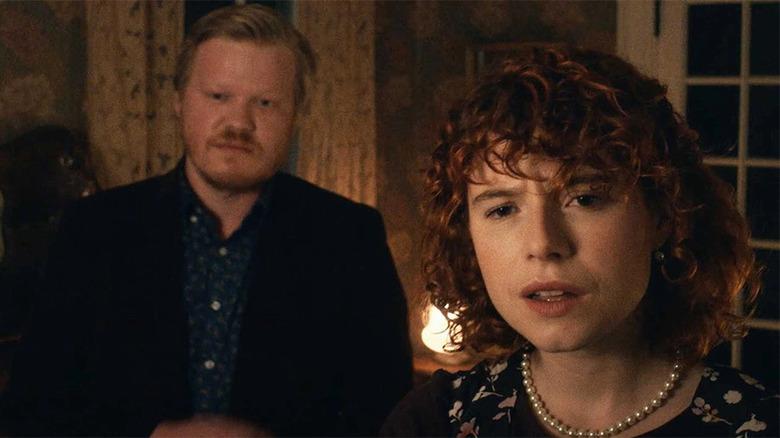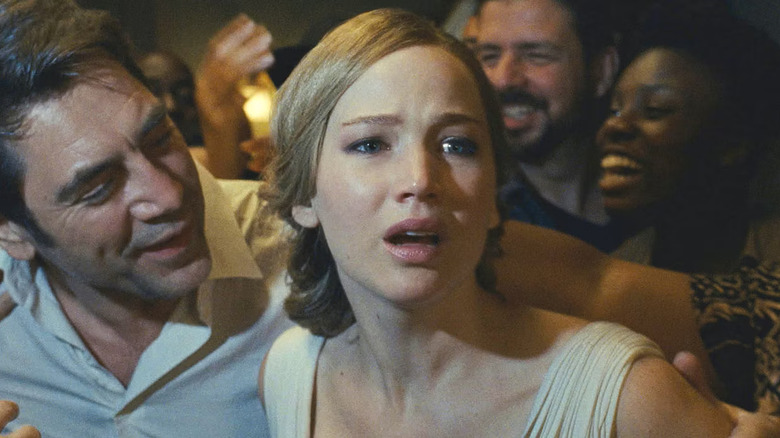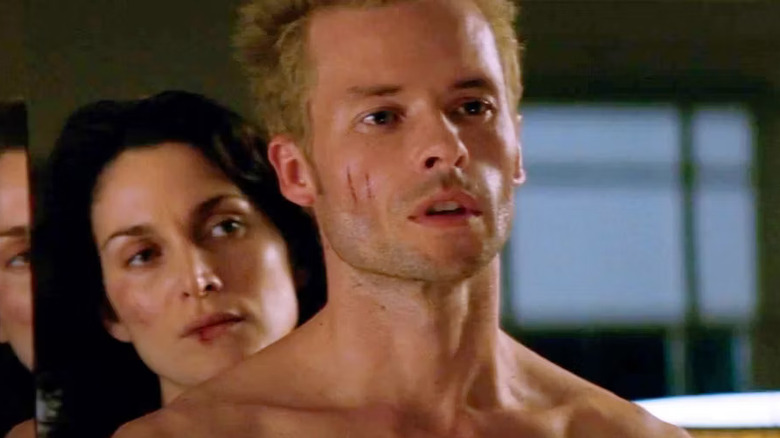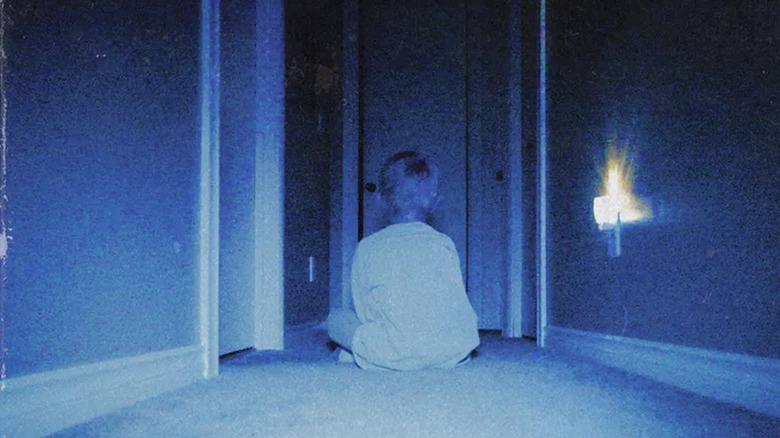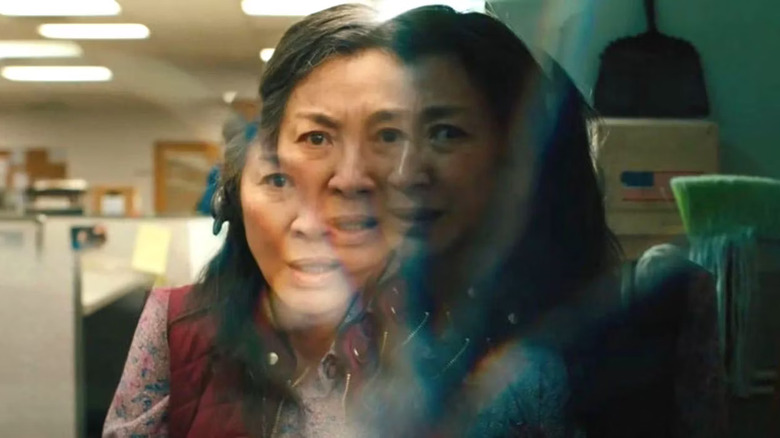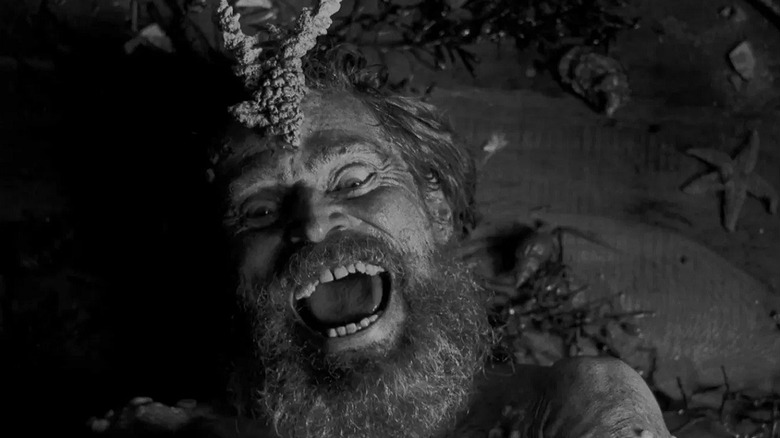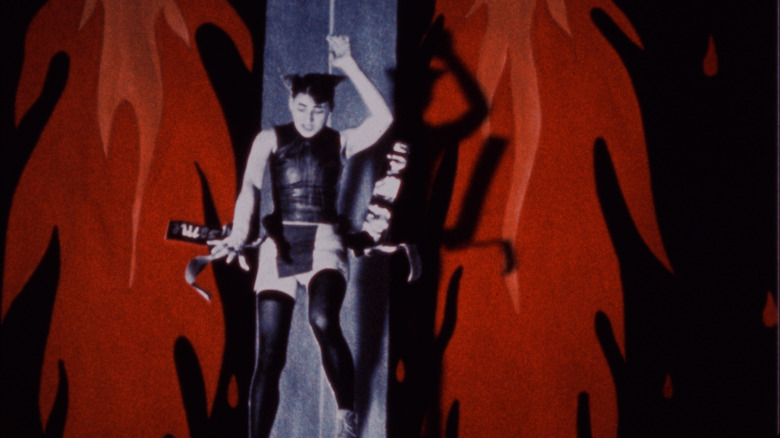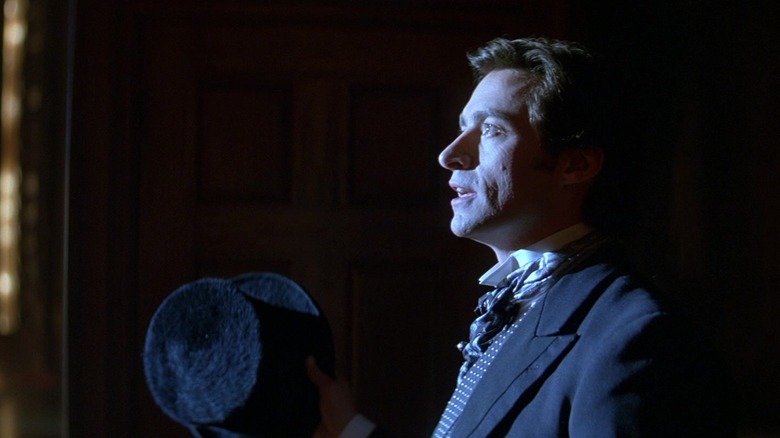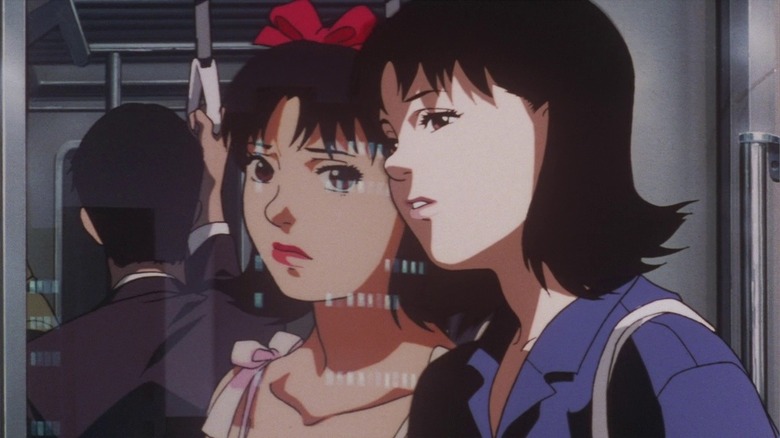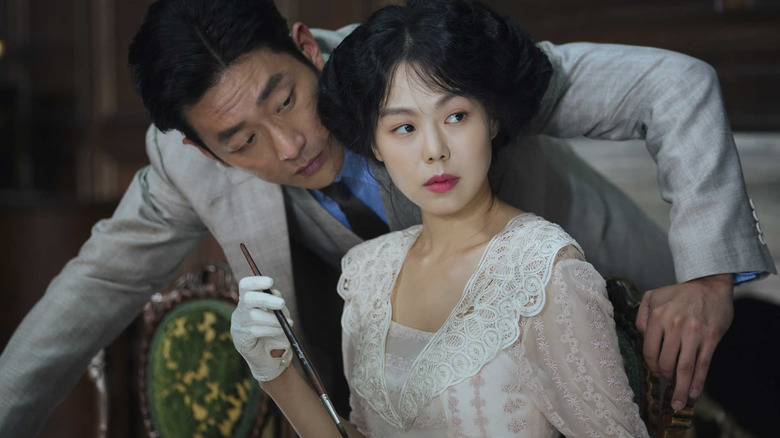The 14 Hardest To Follow Movies Of All Time
Storytelling is not always straightforward. There isn't always a clear beginning, middle, and end or a plot that you can chart on a map and follow from point A to point B. It's a complex art form, one that sometimes requires a bit of confusion to successfully get its message across. Following the plot isn't always the point of a film, and sometimes confusing the audience is a necessary sacrifice when telling a story. Films involving time travel or the multiverse, or ones that dramatize mental health problems, are probably going to be a little tricky to follow simply because of their subject matter.
A movie that is hard to follow is not simply one that is confusing, or where you don't understand the ending, but one where scene by scene, it remains unclear, or perhaps even becomes less clear, what exactly is happening. These are films where the version of events presented, the order they happen in, or even the very reality they exist in is shrouded in doubt. A film that's hard to follow is going to leave the audience struggling to connect the dots throughout the entire movie. For viewers who like their stories simple and their films easy to follow, steer clear of these movies by all means necessary. For those who enjoy when cinema makes them question their sanity, though, definitely add these films to your watch list.
Tenet
The brainchild of legendary director Christopher Nolan, "Tenet" is an exhausting whirlwind of spies, time travel, and disastrous outcomes. The film follows The Protagonist (John David Washington), a nameless CIA agent who must defy the laws of physics, go back in time, and prevent the outbreak of World War III. His only guidance? The use of a single word — "Tenet."
Aside from the complicated nature of time travel and the questions, alternate timelines, and potential scenarios it births, "Tenet" simply moves too fast to comprehend. The film doesn't go in chronological order, but that's not the reason why it's so unfollowable. It's that in addition to fractures in time and characters operating on completely different timelines, every scene moves at a faster-than-light pace and is saturated in action. Before the audience even has time to blink, the film is on to the next task at hand. To top it all off, in order to go back in time, characters must physically move in reverse. These sequences are feats of cinema, unlike those of any other action film that came before.
The plot, structure, and physics of this film are so hard to decipher that Forbes actually did an experiment on the search terms Googled surrounding movie explanations in an attempt to see where this film stood among its cinematic rivals. It found that the explanation to "Tenet" was Googled more than that of any other film in movie history — even the other time travel ones.
Beau Is Afraid
Ari Aster's "Beau Is Afraid" is a dizzying film that's more message and metaphor than plot and dialogue. It centers on a sad, pathetic, lonely man named Beau (Joaquin Phoenix). He is sheepish, incapable, messy, and overall self-loathing. His journey in the film begins when he's missed his flight to see his mother (Patti LuPone) but soon spirals into a series of out-of-control events that resemble a waking nightmare.
After missing his flight and finding out that his mother has died, his apartment is taken over by street-dwellers, he is attacked by a crazed man, taken in by a strange family, becomes part of a mystical theater troupe, and lives an entire alternate life path, all of which causes him to miss his mother's funeral. Follow this with an insanely nauseating monster reveal, and you have audiences stumped. The real twist, however, doesn't come until the very end, when Beau finds out his mother was alive the whole time, and the entire series of events that just unfolded was puppeteered by her as a test of his love.
The themes of the film are not hard to decipher. "Beau Is Afraid" is about guilt, gaslighting, childhood trauma, and manipulation. Aside from this, however, absolutely nothing is clear. The audience knows that the film is indeed about a man named Beau and that he is very, very afraid, but for good reason. He doesn't know what in the world is going on, and neither do we.
I'm Thinking of Ending Things
The plot of Charlie Kaufman's "I'm Thinking of Ending Things" follows a woman (Jessie Buckley) who is going home with her boyfriend (Jesse Plemons) to meet his parents. The title suggests that she is contemplating whether or not to break up with him, which might make audiences think they have a grasp on what's going on, but any assurance is thrown out the window soon enough.
Throughout the film, several certainties and details change or come into question. The narrator's name goes from Lucy to Lucia to Louisa, her career switches from physicist to poet, her appearance is altered, and at one point she's not even played by the same actress. Every interaction and scene seems odd or discombobulated, with little to no connection or transition to what had just occurred. It's as if someone is going in and changing the script at the last second ... as you're watching the film.
The ending reveals that this entire story is taking place inside a random janitor's head. This man is contemplating taking his own life (hence the real meaning of the title) and in doing so is imagining a fictionalized life for himself. This is why details keep changing — he's editing the story in real time, trying to find the version of events that is most realistic, desirable, or consistent. It's an abstract commentary on reality, delusions, and unfilled lives, told in a shifting, intangible style that confuses and befuddles the audience.
Mother!
If there ever were a movie that's metaphor over matter, it's Darren Aronofsky's "mother!" The film is a psychological thriller, arguably even a horror, that shocks audiences with a fierce and terrifying descent into a mother's worst fears. The film follows a pregnant woman (Jennifer Lawrence) and her husband (Javier Bardem), who live a quiet and uneventful life and soon expect their family to grow. Their expectations are indeed met, but not in the way they would ever wish for.
While at the house, a strange couple (Ed Harris and Michelle Pfeiffer) arrives, scaring the young mother. As their behavior grows increasingly erratic, and more and more people begin camping out in her home, she voices her anxieties to her husband. He continues to brush them off, even as their house is destroyed and threats to the safety of her and her baby are made. By its resolution, things have quite literally gone up in flames, and no member of the family seems to survive.
The entire film feels like a dream. It eludes all sense of reality, logic, and traditional storytelling and replaces them with feverishly gruesome sequences that challenge viewers' minds as well as their stomachs. The possible interpretations of this film are endless and abstract, ranging from simple insanity to artful biblical allegories. This isn't a film where you Google the ending — it's a film where you have to do extensive research on each individual scene if you want the slightest chance of comprehension.
Memento
"Memento" is one of the most confusing movies ever made. Another, earlier film by "Tenet" director Christopher Nolan, this movie follows Leonard Shelby (Guy Pearce). Leonard has short-term memory loss and cannot form new memories, and he wakes up every morning with his last recollection being the assault and murder of his wife (Jorja Fox). Despite his memory resetting on a daily basis, or even multiple times a day, Leonard is set on finding and killing the man he believes stole his life from him.
With no capability to create new memories, this might seem an impossible task. However, Leonard has a system. He keeps track of key information by tattooing it on his body, taking Polaroid photos, and staying wary of people around him who might want to take advantage of his condition. However, as this fractured timeline progresses, it becomes clear that no system is perfect. People can't be trusted, clues can be jumbled, and memory isn't always reliable.
On top of the difficulty of keeping track of the plot when the main character doesn't even remember what happened only minutes ago, the film is also structured out of order. Some scenes are presented chronologically, while others go in reverse order, differentiated by whether they're in color or black and white. No piece of this puzzle is put in place until the very end, and even then, the audience can never be sure of what happened or when.
Skinamarink
Following two children (Lucas Paul and Dali Rose Tetreault) who have woken up in their house with the lights off, their parents (Ross Paul and Jaime Hill) gone, and paranormal happenings occurring, "Skinamarink" is one of the creepiest and most frustrating films ever made. It is completely impossible to follow, not in the traditional sense of a complicated plot, a time travel screwdriver, or a multiversal cocktail, but because there is very little to follow. The plot is next to nonexistent, and there are unbearably long stretches of time where quite literally nothing happens. It's as if detention were a nightmare in the most literal sense.
This is not a failure on the part of Canadian writer and director Kyle Edward Ball, but rather intentional. The film is shot from a child's-eye perspective, with little to no lighting. Most of the shots are dimly jagged semi-visuals of disheveled rooms, blank walls, and empty hallways, overlaid with the soft and incoherent whispers of the children. Watching the film is like being in the "Blair Witch" universe and being forced to stand in a corner staring at nothing for hours on end.
However, this directorial style is the reason why the film is so unsettling. At least in a traditional horror movie, you know who or what your enemy is. You know what the worst-case scenario looks like, and you probably have a few plans for how to avoid it. In "Skinamarink," you have no idea what you're in for ... or what could be lurking around the corner.
Everything Everywhere All at Once
The surprise box office hit that broke A24's record and swept at the 2023 Oscars, "Everything Everywhere All at Once" will go down in history as one of the most beautifully confusing movies ever made. The film follows Evelyn Quan Wang (Michelle Yeoh) as a middle-aged Chinese-American immigrant struggling to keep her business and family afloat amid an audit. It's a simple and straightforward plot, with no tricks up the sleeve.
Never mind. Not even half an hour into the film, a brush with the IRS has escalated into a maddening mosaic of the multiverse. It's revealed early on that there is an all-powerful villain, Jobu Tupaki (Stephanie Hsu), who wants to destroy the world, and the only person who can stop her is Evelyn. Well, it's actually only one version of Evelyn across the entire multiverse who can stop her, and she can only do so by being the weirdest human possible and doing things no one would ever do. Eat chapstick, or staple something to your forehead, and you'll save the world. Make sense?
The film completely demolishes audiences' grasp of the plot with a bombardment of special effects, a never-ending series of random and unpredictable acts, and total fractures of infinite realities. Literally, the screen fractures into multiple, simultaneously occurring universes at several different points. It's not the most confusing ever made — the plot does come into focus every now and then — but it's fairly difficult for anyone to keep track of everything ... everywhere ... all at once.
The Lighthouse
"The Lighthouse" is a nightmarish thriller centered on two lighthouse keepers (Robert Pattinson and Willem Dafoe) stranded on a remote New England island in the 19th century. While the film is strange from the get-go, with both men taking on odd personas, mannerisms, and dialogue, audiences cannot be prepared for the nauseating journey that awaits them.
As days on the island pass, with dwindling supplies and no hope of a return to civilization any time soon, madness begins to take hold of both men. They grow increasingly distrustful of one another, but with the only other option being complete isolation, they are also forced to spend time in each other's company. Tensions continue to rise, and pretty soon, both men are at each other's throats. They've gone completely insane and are in a fight for survival not only against the elements and each other but against their own minds.
At its outset, Robert Eggers' "The Lighthouse" is an odd but fairly straightforward film. However, it quickly devolves into a chaotic jumble of jibberish, delusions, nightmares, and paranormal happenings. Since neither of the only two characters in the film can trust their own minds, neither can the audience, and the film drags you into its insanity. By its resolution, you're questioning who either of these men are, if they're actually the same person, if one of them is some sort of sea god, or if it's all taking place in one of their heads. Be warned — the film answers exactly zero of these questions.
Flaming Ears
Aside from the occasional film fanatic or lover of arthouse auteurs, "Flaming Ears" is not a movie that most people have ever heard of. It's an Austrian 1991 experimental film that throws audiences into a beautifully chaotic world of queerness and science fiction and leaves them to fend for themselves.
Set in the ruined city of Asche in the post-apocalyptic future, the film follows the intersected lives of three women who engage in a love triangle of desire and destruction. As the film bobs and weaves among these women's narratives, audiences are disoriented by the world that's been created for them. With stop-motion cityscapes, wardrobe design far beyond the current fad, and sets constructed straight from the underbelly of society, it's hard for audiences to grasp what's being put in front of them, much less follow any semblance of the already-abstract storyline.
To audiences who enjoy the works of traditional cinema, this film offers little. The dialogue is minimal, the quality is shoddy, and the plot is almost intentionally withheld. The theme of the film is rebellion, and this extends not only to its context and final form but also to its consumers. However, if you're capable of abandoning the intrinsic desire to "follow the film," you'll be rewarded with a mesmerizing descent into a world that could only ever be imagined for you. Adopt a devil-may-care attitude toward the story, and you'll gain a heaven-only-knows glimpse into the future.
Looper
"Looper" is a traditional tale of time travel with one primary twist. The primary "Looper" timeline takes place in 2044, when time travel has not yet been invented. However, 30 years in the future, it will have been invented, and crime syndicates use this to their advantage, sending unfortunate souls back in time to be killed and disposed of by "loopers." Even more disturbing is that sometimes, loopers are made to kill their future selves.
This is precisely what happens to the protagonist of the film, Joe (Joseph Gordon-Levitt). While his kills are usually executed with no problems, when his older self (Bruce Willis) comes back, he escapes. Future Joe is on a mission to kill the child (Pierce Gagnon) who will grow up to be the man who kills him and his wife (Summer Qing) in 2074. Present Joe must find and kill future Joe, despite knowing he will die in 30 years — because if he doesn't, the mob will kill him now.
Rian Johnson's film is not hard to follow because there are jumps back and forth in time, most of the film is fairly grounded and progresses in chronological order. However, things get easily jumbled when dealing with the implications of changing the past or future. Which Joe do you root for? If present Joe dies, what happens to future Joe? Will the timeline change, branch off, or simply cease to exist? It's impossible to keep track of the plot when your mind is constantly racing to predict scenarios and solve for "x."
The Prestige
Another dizzying hat trick from director Christopher Nolan, "The Prestige" is a period thriller set in Victorian London, following the tangles lives of two rival magicians, Alfred Borden (Christian Bale) and Robert Angier (Hugh Jackman). The magicians were once partners, but following an unfortunate accident, they part their separate ways to take up solo acts and chase their own fame. However, these slippery lads can't seem to get out of each other's hair, and they proceed to engage in a lifelong battle of wits and tricks, with devastating consequences for their personal lives.
Each man is brilliant in his own right, scheming up complicated plots involving Trojan horses, jail time, body doubles, and scientific revolution. At their cores, they're spiteful con men with hankerings for revenge and glory, but they're also artists, illusionists, and inventors. It's never clear what they're going to scheme up next, and whether everything, or nothing at all, will go as planned.
A story built on the act of distraction and deceit, there's no shortage of twists and turns for the audience to get lost in. The film itself is a magic trick, complete with red herrings, unreliable narrators, charismatic showmanship, and a reality-shattering reveal. The trick of the trade is that you want to pull the audience in and make them think they're following you. All the while, you're two steps ahead, putting together a finale that will knock them off their feet and leave them wondering what in the world just happened.
Perfect Blue
Satoshi Kon's "Perfect Blue" is a 1997 animated Japanese psychological thriller that challenges notions of reality and of the self. The film follows Mima (Junko Iwao in Japanese and Ruby Marlowe in the dub), a J-Pop star who abandons her singing career to act in the TV crime drama "Double Bind." As Mima's image devolves from rosy to raunchy, she is stalked by an ominous man, people she works with are murdered, a strange blog called "Mima's Room" posts intimate details of her personal life, and an alter-ego avatar of Mima torments her. At the same time, she continues to work on the show, playing a character who happens to have dissociative identity disorder.
At no point in the film is the audience, or even Mima herself, sure of what's true and what's imagined. Is she the real Mima? Is there a real Mima at all? Is any of this actually happening? Jarring cut-aways, "Mima's Room" updates, "Double Bind" shoots, and unsettling animations don't aid audiences to separate fact from fiction. The film presents an untrackable and disorienting series of delusional realities that burrow under the skin, instilling existential doubt, confusion, and fear.
Many fans of the film have actually pointed to the film's use of visual distortion and mediums, body horror, and commentary on the entertainment industry as evidence of inspiration for the 2010 Oscar-winning thriller "Black Swan." Whether or not this is true, if you're a fan of thrillers that blur the lines between reality, delusions, and notions of the self, "Perfect Blue" is for you.
Enys Men
"Enys Men" is a slow-burn, eerie English psychological horror. It follows a protagonist known as "The Volunteer" (Mary Woodvine), a middle-aged woman stranded on a remote island. It's unclear who this woman is, where she came from, and how she got on the island. Despite an hour and a half of opportunity to fill in the blanks here, by the film's resolution, all of these questions are virtually unanswered.
In lieu of plot, the audience watches the protagonist go about each day in an incredibly uneventful and routine manner. She gets up, tends to her island duties, and goes to bed. There's no one else on the island to interact with, though she occasionally enjoys the company of her hallucinations. These come in the form of a teenage girl, an older woman, some dirty miners, and a strange preacher singing solemn hymns. There is a supply man who visits her once, but it's unclear whether he is real or another fiction of her incredibly stunted imagination.
The truly frustrating thing about these hallucinations is that don't advance the plot forward in any way, offering no meaningful dialogue or interaction. The one thing that moves the story forward is the strange growth of lichen on the woman's body, which is where the unsettling body horror element of the film comes in. Still, it's unclear whether this is also a hallucination or not and what it means in the context of the story. The audience may watch, but they hardly ever follow.
The Handmaiden
"The Handmaiden" is a psychological thriller and romance that takes up the class and social commentary of "Parasite," but meshes it with an erotic and complicated love triangle. Set in Japanese-occupied Korea in the 1930s, the film follows Sook-hee (Kim Tae-ri), a pickpocket who gets roped into a money-grabbing scheme by a fellow con man (Ha Jung-woo).
The plan goes as follows: Sook-hee will become the handmaiden of a rich heiress, Lady Hideko (Kim Min-hee), whom she will convince to marry the con man. Once married, they will have Lady Hideko committed to an asylum, and steal her fortune. This plan seems to go smoothly at first but is disrupted when Sook-hee begins to fall in love with Lady Hideko. This is only the first of many twists to come, as love, revenge, and greed all take hold of each central character.
Every time the plot becomes clear, the film takes a sharp left turn, leaving audiences with severe whiplash. This is facilitated by the film's unique structure, which is divided into three acts. Each of these acts is told from a different perspective, which completely negates the events, intentions, and outcomes of its predecessor. Anything that is revealed must be questioned, leaving audiences just as skeptical of the film's version of events as the characters in the film are of each other. There is no possible way to follow the plot as it's unfolding — only in posterity is the audience offered a chance at scraping together the fractured pieces of the puzzle.



